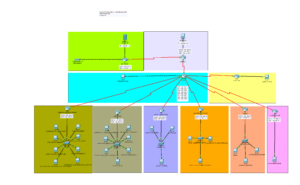Abstract:
As digitalization has become an essential part of our lives, the threats to cybersecurity have also increased significantly. India, being the world’s second-largest internet user base, has become a prime target for cybercriminals. In this paper, we will discuss the current state of cybersecurity in India, including the challenges faced, legal framework, initiatives taken by the government, and future prospects.
Introduction:
India is rapidly digitizing, with the government pushing for digitalization to reduce corruption and increase transparency. However, with digitalization comes the threat of cyber attacks. Cybersecurity has become a crucial concern for individuals, businesses, and government organizations in India. In 2020, India was the second-most targeted country for cyber attacks globally, with a 37% increase in such attacks from the previous year.
Challenges:
The challenges faced by cybersecurity in India include a lack of awareness, outdated technology, and inadequate skilled workforce. The majority of Indian companies and individuals are unaware of cyber threats and their consequences. There is also a lack of investment in cybersecurity, which has resulted in outdated technology and inadequate skilled workforce.
Legal Framework:
The Information Technology Act, 2000, is the primary law governing cybersecurity in India. It provides legal recognition to electronic records and digital signatures, and provisions for cybersecurity breaches. The act has been amended several times to include new provisions to combat cybercrime.
Initiatives:
The Indian government has launched several initiatives to improve cybersecurity in the country. The Cyber Swachhta Kendra is a platform launched by the government to provide cybersecurity solutions and awareness to citizens. The National Cyber Coordination Centre was established to provide real-time monitoring of cyber threats and coordinate responses. Additionally, the government has launched various cybersecurity training programs and has partnered with private organizations to develop cybersecurity solutions.
Future Prospects:
The future prospects of cybersecurity in India are promising. The government has recognized the importance of cybersecurity and is taking steps to improve the situation. With the increasing adoption of digitalization, there will be a greater demand for cybersecurity professionals and advanced technology.
Conclusion:
In conclusion, cybersecurity in India is a critical concern, and the country faces several challenges. However, with the government’s initiatives and increasing awareness, the future prospects are promising. There is a need for continuous improvement and investment in cybersecurity to keep up with the evolving threats.
References:
India Today. (2021). India recorded 22% rise in cybercrime in 2020, second most cyber-attacked country globally: Report. Retrieved from https://www.indiatoday.in/technology/news/story/india-recorded-22-rise-in-cybercrime-in-2020-second-most-cyber-attacked-country-globally-report-1811311-2021-04-01
The Economic Times. (2021). India’s cybersecurity needs urgent attention: Experts. Retrieved from https://economictimes.indiatimes.com/tech/internet/indias-cybersecurity-needs-urgent-attention-experts/articleshow/81902372.cms
Ministry of Electronics and Information Technology. (n.d.). National Cyber Security Policy 2013. Retrieved from https://www.meity.gov.in/content/national-cyber-security-policy-2013
National Cyber Security Coordinator. (n.d.). National Cyber Coordination Centre. Retrieved from https://ncsc.gov.in/ncsc.html
National Association of Software and Services Companies. (n.d.). Cyber Security. Retrieved from https://www.nasscom.in/cyber-security.







